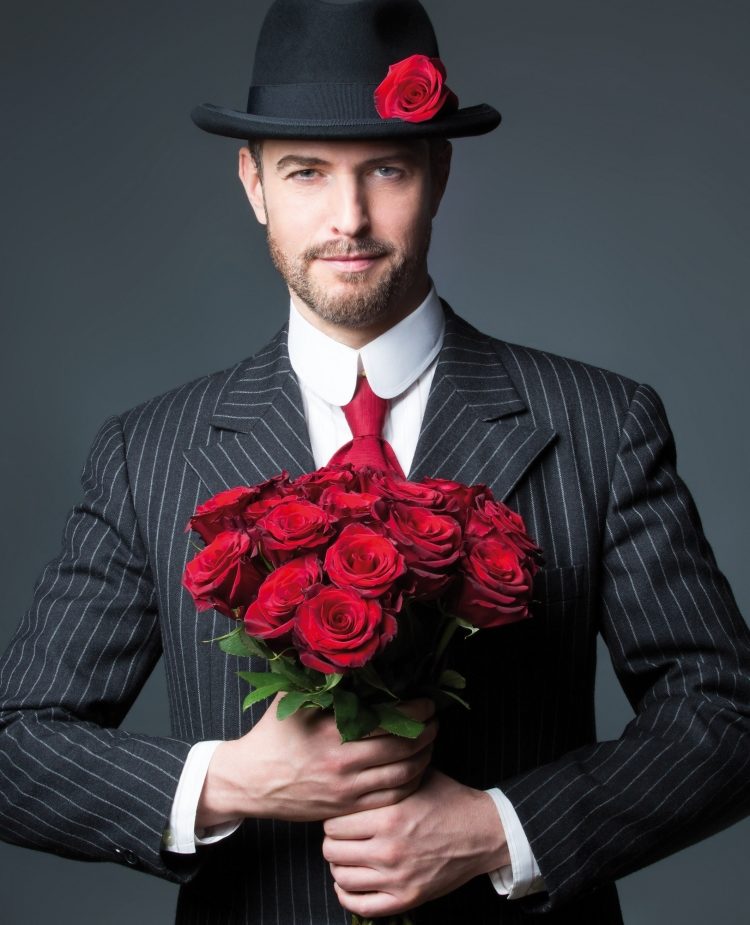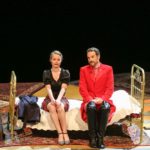 ‘I’m thinking of you, dark-haired Ninetta’, sings the handsome stranger in his first appearance in Millöcker’s operetta. But ‘Ninetta’ never actually appears. It’s the beautiful Countess Carlotta – love at first sight – who eventually gets the dark-red roses dunkle roten Rosen.
‘I’m thinking of you, dark-haired Ninetta’, sings the handsome stranger in his first appearance in Millöcker’s operetta. But ‘Ninetta’ never actually appears. It’s the beautiful Countess Carlotta – love at first sight – who eventually gets the dark-red roses dunkle roten Rosen.
Carl Millöcker’s operetta, is set in Sicily, Gasparone apparently the head of a band of smugglers who, like a mafiosi, holds Trapani in its grip: the innkeeper Benozzo a front for a booming smuggling business, people kidnapped and money extorted. (In the comedy, it’s the Countess who’s ransomed, in a scam involving the Mayor, who wants Sindulfo his son to ‘rescue’ and so marry Carlotta.)
Millöcker’s 1884 operetta was re-worked, textually and musically, for its jazz-influenced 1931 Berlin revival by Ernst Steffan and Paul Knepler: the basis for this new Vienna Volksoper production. Volksoper’s programme notes differentiate operetta from opera as ‘work in progress’, adapting to changing times and audiences; operetta has ‘an ironic, subversive twist’.
But this is no excuse for director Oliver Tambosi’s awful excesses, opening with a white t-shirted link-man flippantly ad-libbing introducing us the plot. Christian Graf (as Luigi in the text) does a tour of the main characters, lying in their beds on the revolving stage.  From the Mayor, Sindulfo his son, Benozzo the innkeeper, to Carlotta the target of the scam. The hilly, undulating, stage turns out to be, not a map of Sicily as I’d imagined, but a patchwork of oriental rugs. This (Andreas Wilkens’) was the scruffiest set I’ve seen here in ages, and most of the other scenes are loud and kitschy.
From the Mayor, Sindulfo his son, Benozzo the innkeeper, to Carlotta the target of the scam. The hilly, undulating, stage turns out to be, not a map of Sicily as I’d imagined, but a patchwork of oriental rugs. This (Andreas Wilkens’) was the scruffiest set I’ve seen here in ages, and most of the other scenes are loud and kitschy.
But it’s worth staying for the music, classic Viennese operetta, and some outstanding performances, with Vienna Volksoper Orchestra under Andreas Schüller scintillating and classy.
Sebastian Geyer, as ‘the Stranger’ appears in red cloak and black riding boots: like one of the Musketeers on a mission. Geyer’s baritone is impressive, the rich sonority you hope for in the best traditional operetta. (Geyer also sings the serious stuff for Opera Frankfurt.) Geyer’s red roses aria, the hit tune, is the high point, but also a preview of Millöcker’s musical gems. Even if Dunkel Rosen bringe ich schöne Frau was not in Millöcker’s premier (Theater-an-der-Wien), but re-discovered from later Millöcker, and added on by Steffan and Kepler.
Now four bandits are playing cards – lusty, vigorous singing, authentic wienerisch accents – telling of how the police are chasing the phantom bandit Gasparone, and of their plan to kidnap Carlotta. The bandits sing of sugar and coffee smuggling as “the one true profession”. Ja, die Liebe der Banditen ist Gold, das Gold nur allein! The bandit’s only love is gold; what a glorious life it is to be a robber! So the mystery stranger feeds the Gasparone myth. The Mayor Nasoni (Gerhard Ernst) is taken in and swears he’ll get that damned Gasparone: ‘I’ll tear him apart when I catch him.’ Ernst, mellow experienced bass, and a real character actor, offers 10.000 lira for Gasparone’s head. And then Carlotta is kidnapped.
Julia Koci ‘s Carlotta is outstanding, her heavenly soprano another reason to stay seated through the scenic mess. ‘To be alone in the forest, wonderful but dangerous!’ she sings. Geyer, now posing as Erminio, sings if only he were a bandit he’d demand a ransom (so they couldn’t pay it.)
 Geyer and Koci are sitting on a bed in absolute silence! For seemingly an eternity. Infuriating! Then she asks, do you want to sing in a duet with me? How glad I am to see you here! In their duet – Whenever I think of you- Koci is super, and Geyer, aroused and inspired by her. If he had to risk his life again, he’d do it gladly! This sometimes tatty production is worth enduring for this nightingale. And Millöcker’s music, here at its best, is pure magic.
Geyer and Koci are sitting on a bed in absolute silence! For seemingly an eternity. Infuriating! Then she asks, do you want to sing in a duet with me? How glad I am to see you here! In their duet – Whenever I think of you- Koci is super, and Geyer, aroused and inspired by her. If he had to risk his life again, he’d do it gladly! This sometimes tatty production is worth enduring for this nightingale. And Millöcker’s music, here at its best, is pure magic.
But there follows a crass, but colourful number with Sindulfo (David Sitka), the Mayor’s son – intended to marry Carlotta – but out on a night on the town with the girls. Sindulfo is a fun character, gutsily sung by Sitka , who’s surrounded by scantily-clad chorus girls in bright red. There follows a seaside beach fantasy, imagining how the Mayor would spend his million from the Countess’s dowry. Way over-the-top and trashy.
By contrast Geyer sings to Carlotta in Liebe erhellt die ganze Welt to beware of false promises; love is the safer bet. Then there’s an exotic dance sequence- a tarantella- the orchestra’s trumpets blazing, tremendous brass against pizzicato strings. Geyer sings, in his solo, this woman has captured his heart: the mayor’s engagement cannot be!
Act 2 begins with a highlight, a cabaret-like performance from Gerhard Ernst’s Mayor. Unexpectedly, a tour-de-force reminiscing, those were the days. He was a young man once, though you’d never think it; his slim figure was renowned. Ernst looks uncannily like Vienna’s former Mayor Michael Haupl – genial, witty, a little corpulent. He sings, he was never one for maths, but always good at addition: he had three or four at a time! (Operetta is all about wine, women and song: not to our 21st century standards.) Then he receives a letter, his son has been kidnapped.
The other highlight reprises Rote Rosen bringe ich , I bring you dark-red roses red roses: now sung to CarIotta. Like an Interflora jingle- ‘We say with flowers what we cannot say in words’- but what a gem. In the disguise of Erminio, Geyer climbs in to the Countess’s room. (He will eventually offer her the proceeds from the Mayor’s scam.) Anyway Carlotta gets the message, ‘Gasparone’ and Erminio are the same. Any excuse for their gorgeous duet, say three words. The magic sound of his voice makes her lose her senses; they’re transported heaven-bound. ‘Silver Age’ Viennese operetta.
In the bizarre plot Benozzo hoodwinks the Mayor, absconds with the 10,000 lira. There’s a super dance routine with Marco di Sapia as Benozzo , and his wife Sora (Johanna Arrouas), neglected nights through Benozzo’s escapades . She’s from Sevilia, he’s from Sicilia, Di Sapia and Arrouas get very close and physical in a very stylish tango.
Meanwhile Benozzo is relating – to a table of listeners-  of ‘the dark night when he lost the ransom at the Vampire Inn.’ (A likely story.) He’s driven out by the Mayor, leading a terrific Chorus Trara-Trara– to catch Gasparone.
of ‘the dark night when he lost the ransom at the Vampire Inn.’ (A likely story.) He’s driven out by the Mayor, leading a terrific Chorus Trara-Trara– to catch Gasparone.
Geyer’s Gasparone, now in a sexy black catsuit, appears out of a moonlit dream sequence imagined by Carlotta, Koci asleep side of stage. He’s a robber, he sings, ‘I only want gold and diamonds’. The glorious life of a bandit anthem is repeated, but this time the sentiment is ironic. Sweet dreams! He brings a silver case containing the Mayor’s one million cut, thus scuppering the Mayor’s plans to marry off his son.
I couldn’t possibly reveal ‘Gasparone’s identity; maybe the stranger was on an undercover mission? Anyway, Geyer and Koci’s reprise their Liebe duet, love should guide and accompany us. Never fail when you listen to your heart.( Or something like that.) The poetry is in Millöcker’s melodies.
More Millöcker, please, but not this production, which was reprieved by wonderful singers, and Volksoper orchestra and Chorus on top form. Also stunning choreography from Vienna State Opera dancers. At least Volksoper are now encouraging an English-speaking audience with English sub-titles. P.R. 10.09.2018
Photos: Sebastian Geyer (Gasparone, the Stranger); Gerhard Ernst (Mayor), Johanna Arrouas (Sora), Mara Mastalir (Carlotta); Sebastian Geyer (Gasparone) Mara Mastalir (Carlotta); Marco di Sappia (Benozzo) Featured image Gunter Haumer, Julia Koci
(c) Barbara Palffy / Volksoper Wien

Excellent post certainly